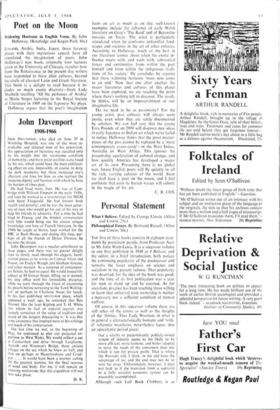John Davenport
1908-1966
JOHN DAVENPORT. who died on June 27 in Worthing Hospital, was one of the most re- markable and talented men of his generation. His appreciation of literature was equalled only by his insight into the wearisome condition of humanity; and these great qualities were fused by his wit, which could have the most exhilarat- ing effect on one. Impossible, of course, to deny the dark moments; but these increased one's affection and love for him, as one realised the immense dignity and heroism with which he bore the burden of times past.
He had lived many lives. He was at Cam- bridge with William Empson in the early 1930s. and later he worked as a screenwriter for MGM with Scott Fitzgerald. He had known both wealth and poverty; and he was the most gener- ous of men who would go far out of his way to help his friends in adversity. For a time he had lived in France, and the briefest conversation with him would bring out his almost unique knowledge and love of French literature. In the 1940s he taught at Stowe. later worked for the BBC at Bush House, and during this time, per- haps of all the friends of Dylan Thomas, he became the closest.
John Davenport was a regular contributor to these pages, and there was no greater delight than to slowly read through his elegant, hand- written pieces as he wrote on Conrad Aiken and Proust, on Evelyn Waugh and Graham Greene, and other masters. As a reviewer of contempor- ary fiction, he had no equal. He would frequently appear at 99 Gower Street, filling, so it seemed, my tiny office with his formidable presence. while we went through the ritual of examining his proofs before retreating to the 'Lord Welling- ton' or perhaps to Charlotte Street for lunch. In his last published SPECTATOR piece, which appeared a week ago, he remarked that Rex Warner, like the later Kipling and T. H. White (for whom he had an especial regard), was 'acutely conscious of the value of tradition and aware of the dangers threatening it.' It was this same awareness that inspired most of his writings and much of his conversation.
The last time we met, at the beginning of May, we continued to plot our projected ex- pedition to West Wales. We would collect a car at Carmarthen and drive through Laughame, Amroth and Wiseman's Bridge, those ancient villages on the sea which he knew so well, and then on perhaps to Haverfordwest and Cardi- gan. . . . It would have been a journey calling for the greatest stamina. for the final reserves of mind and body. For me, it will remain an enduring misfortune that this expedition will not now take place.
D. R.






























 Previous page
Previous page